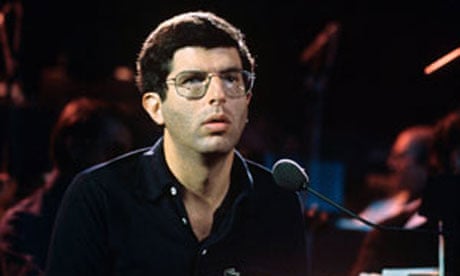The American musician Marvin Hamlisch, who has died aged 68 after a short illness, won three Oscars, four Emmys, four Grammys and a Tony award in the course of composing A Chorus Line and a host of movie soundtracks, including The Sting and The Way We Were. Barbra Streisand, who starred in the latter film alongside Robert Redford, praised Hamlisch for "his brilliantly quick mind, his generosity and delicious sense of humour, which made him a delight to be around".
Hamlisch began his professional career working as a rehearsal pianist for Streisand's Broadway show Funny Girl. A meeting with the film producer Sam Spiegel led to his first film score, for The Swimmer (1968), and he then worked on the early Woody Allen movies Take the Money and Run (1969) and Bananas (1971).
By the early 1970s, Hamlisch was on a spectacular creative streak and swept the board at the 1974 Oscars. He won two statuettes for his work on The Way We Were, for best original score and best original song. He earned his third Oscar for the score for the Robert Redford/Paul Newman smash The Sting from Scott Joplin's ragtime music, featuring The Entertainer as the main theme. Meanwhile, The Way We Were also brought him four Grammys.
The following year, Hamlisch achieved his ambition to create a Broadway show by writing the music for A Chorus Line, with lyrics by Edward Kleban. An instant success, the show was nominated for 12 Tony awards and won nine, including best musical and best score, and in 1976 won the Pulitzer prize for drama, a rare accolade for a musical.
Hamlisch would never repeat the success of A Chorus Line, though he enjoyed further acclaim for They're Playing Our Song (1978), based on his real relationship with Carole Bayer Sager, who wrote the lyrics for Hamlisch's music. Less auspicious was his 1983 flop, Seberg, while neither Smile (1986) nor a musical version of Neil Simon's The Goodbye Girl (1993) found much favour with audiences.
Hamlisch exhibited his impeccable pop craftsmanship with Nobody Does It Better, the theme song for the James Bond film The Spy Who Loved Me, on which he again collaborated with Bayer Sager. Carly Simon's performance took the song to No 2 on the Billboard singles chart, and it was nominated for an Oscar in 1977. It was once described by Radiohead's Thom Yorke as "the sexiest song ever written". Hamlisch was irked that it did not win an Oscar. In performances he used to include it in a medley of "all the greatest songs that have lost the Academy award."
He continued to compose soundtracks for a string of memorable films, including Robert Redford's directorial debut, Ordinary People (1980), and Sophie's Choice (1982), starring Meryl Streep – which brought Hamlisch another Oscar nomination. Director Steven Soderbergh sought out Hamlisch when he needed music for his 2009 film The Informant!, and found him an ideal collaborator. "In the first meeting he described what the orchestra would be, what instruments, how big," Soderbergh commented. "He knew right from the beginning."
Hamlisch was born in New York City to Jewish-Viennese parents, Lilly and Max Hamlisch. His father played the accordion and led his own band, and passed on a powerful musical gene to his son, who was born with perfect pitch and began playing piano at the age of five. He was accepted into New York's Juilliard School before he turned seven. He studied classical piano, but recalled that it soon became clear to him that he "was not going to be the next Horowitz. But I wanted to be the next important – let's say – composer."
Pop and musical theatre were his true loves, and he cited among his chief inspirations the musicals My Fair Lady, Gypsy and West Side Story. He met Liza Minnelli in his teens – "I was a friend of a guy who Liza was dating" – and precociously played piano for her mother, Judy Garland, at a Christmas party. "I knew everything Judy did," he recalled. "She picked a rather obscure song, which was The Christmas Waltz by Jule Styne, and I knew it." Later, Hamlisch would work as arranger on several Minnelli albums, not least Judy Garland and Liza Minnelli Live at the London Palladium.
He also enjoyed a parallel career as an orchestral conductor, regularly conducting "pops" concerts – of light classical and popular music – with orchestras in Pittsburgh, San Diego, Pasadena, Washington DC, Milwaukee and Dallas. These allowed Hamlisch, a popular chatshow guest, to show off his skills as wit and raconteur alongside his musicianship. "My whole thing is not just to play music for people, but to make them part of the evening," he said. "Many years ago I was one of the few conductors who talked to the audience, and now a lot of classical conductors have figured it out."
His early work with Streisand developed into an enduring personal and professional relationship. In 1994 he was conductor and arranger on the singer's first tour since 1966, which opened in London before returning to the US for a string of dates. It also produced a television special, Barbra Streisand: the Concert, which earned Hamlisch a brace of Emmy awards. "I really wanted to be part of this," Hamlisch enthused. "Barbra tends to inspire you to rise to her expectations, thereby bringing out the very best in you." In 1998, he played at Streisand's wedding to actor James Brolin.
At the time of his death, Hamlisch had been due to travel to Nashville to see a production of his new musical, The Nutty Professor, an adaptation of the 1996 Eddie Murphy movie. Also in the works was another new musical, Gotta Dance, and Hamlisch had completed the music for Soderbergh's forthcoming film about Liberace, Behind the Candelabra, starring Michael Douglas and Matt Damon.
He is survived by his wife of 24 years, Terre Blair.
